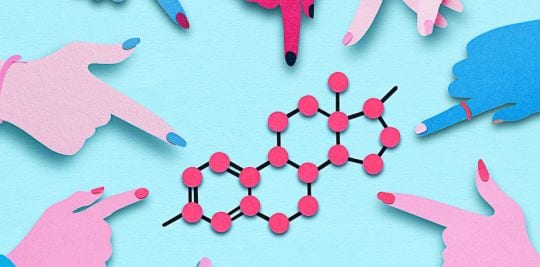
What Is Mood Swing/Changes?
Sometimes you notice that you are feeling good with no specific external factor impacting it. And some days, you feel that you are the dumbest person on this planet, where your confidence levels hit rock bottom, and you feel depressed all day long. Behind all these emotions you feel are hormones working hard in your body.
What Is Hormones?
Hormones play a vital role in controlling your mood, sleep pattern, sexuality, and aging. On the downside, these hormones also lead you to stress, depression, and anxiety.

Can a surge in a particular hormonemake us feel and act like a totally different person? And if so, are we right to blame our out-of-control moments on some kind of biochemical signalling? Here, we look at some of the big notions about how hormones mess with your head and sift fact from fiction.
1. Serotonin – Happiness Hormone
Serotonin is made from the essential amino acid tryptophan. This amino acid must enter your body through your diet and is commonly found in foods such as nuts, cheese, and red meat. Tryptophan deficiency can lead to lower serotonin levels. This can result in mood disorders, such as anxiety or depression.
Serotonin impacts every part of your body, from your emotions to your motor skills. Serotonin is considered a natural mood stabilizer. It’s the chemical that helps with sleeping, eating, and digesting. Serotonin also helps:
reduce depression, regulate anxiety, heal wounds, stimulate nausea, maintain bone health.
Whereas during summers, everyone is happy and excited all round the clock. Serotonin is also known to help you multitask.
How to Increase Serotonin?
2. Oxytocin – Love Hormone
Oxytocin is a hormone and a neurotransmitter that is involved in childbirth and breast-feeding. It is also associated with empathy, trust, sexual activity, and relationship-building.
It is sometimes referred to as the “love hormone,” because levels of oxytocin increase during hugging and orgasm. It may also have benefits as a treatment for a number of conditions, including depression, anxiety, and intestinal problems.
Oxytocin is produced in the hypothalamus, a part of the brain. Females usually have higher levels than males.
The decrease in levels of oxytocin leads to depression and social anxiety. It also participates in controlling sexual desires.
This fact signifies that to stay committed in a relationship, you need reasonable levels of this hormone in your body. Unlike other hormones, oxytocin isn’t found abundantly in foods. It is any emotional well being that releases this hormone. So try to have honest relationships, care, laugh, hug! That’s the secret ingredients for a wellness recipe.
How To Increase Oxytocin?
3. Dopamine – Creativity Hormone

Dopamine is one of the brain’s neurotransmitters—a chemical that ferries information between neurons. Dopamine helps regulate movement, attention, learning, and emotional responses. It also enables us not only to see rewards but to take action to move toward them. Since dopamine contributes to feelings of pleasures and satisfaction as part of the reward system, the neurotransmitter also plays a part in addiction.
Dopamine is heavily involved in the motor system. When the brain fails to produce enough dopamine, it can result in Parkinson’s disease. The primary treatment for Parkinson’s disease, therefore, is a drug called L-dopa, which spurs the production of dopamine. Dopamine has also been implicated in schizophrenia and ADHD, and the brain systems underlying these conditions as well as substance abuse disorder are complex.
The activity of the dopamine system depends on the state of one’s dopamine receptors, for instance—and in people with these conditions, the chemical interacts with other factors in ways that have yet to be explained. People with low dopamine may also be more prone to addiction. The presence of a certain kind of dopamine receptor is associated with sensation-seeking, more commonly known as risk-taking.
When found in desired levels, dopamine makes you feel driven, motivated and creative. It plays a significant role in cognitive function, stimulates attention, memory, and learning.
So you better have this hormone at an ideal level in your body. Dopamine is released in the middle regions of the brain and sends signals to nerve cells. Foods including fish, chicken, egg, nuts, and beans contain lots of dopamine.
How To Maintain Dopamine?
4. Melatonin – Sleep Hormone
Melatonin has a direct relationship with darkness. This hormone is secreted when you are in the dark. And it is also responsible for making you fall asleep.
The secretion of melatonin is at its peak at 2.am. Ideally, this is when you are in the middle of the sleep cycle. Researchers had found that the secretion of melatonin is drastically decreased when people used any light emitting devices while or before hitting the bed.
The best example is using your mobile phones before sleeping. This habit is a definite NO! NO! if you want your body release good levels of melatonin.
Decreased amounts of melatonin can lead to stress, depression or even cancer. So take it seriously and make sure you get quality sleep of at least 7 to 8 hours every day. Cherries contain lots of melatonin.
How To Help Our Body Generate Increased Levels Of Melatonin?
5. Endorphins – Pain Relievers
These are hormones that are released in our brain after severe physical exercise or sex. These hormones act as a reward system for our brain.
Endorphins are commonly known to influence the so-called ‘runners-high.’
It is a state of mind, with a sense of positivity and feeling good factor that runners experience after a massive run. After a certain point of running, these hormones reduce the perception of pain and hence act as a natural pain and stress busters. The same applies to sex too.
Swimming, bathing in cold water, sauna, etc. also generate endorphins. Well, you now know how to increase levels of endorphins in your body?
6. Adrenaline – Adventure Hormone
Facing danger naturally generates adrenaline. The hormone is secreted in response to flight-fight mode, where the brain and the body either need to fight the threat or flee.
Symptoms of such situations are when you sweat, feel fear and the stress to combat the danger in front of you. Your heart starts pumping blood at a rapid rate. So adrenaline sends signals to push more blood towards blood canals routing to the heart and lungs.
Adrenaline stimulates your brain and makes you decide and act efficiently. It increases your focus so much you are not aware of the pain while escaping the danger. This behavior is also commonly referred to as “Rush of the Adrenaline.”
Foods including vitamin C and B, are known to support the function of the adrenal glands.
Include foods like:
- oranges,
- mangoes,
- peaches,
- leafy greens,
- avocados,
- bananas,
- potatoes,
- oats,
- and legumes in your regular diet.